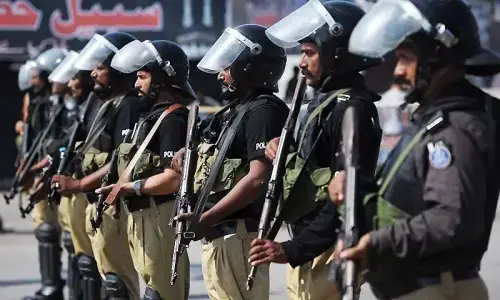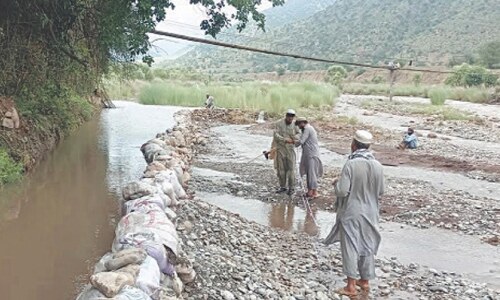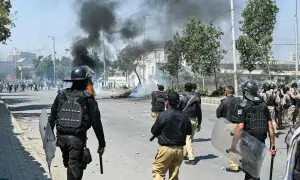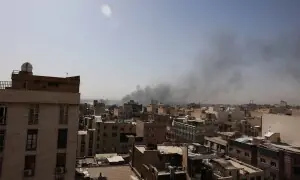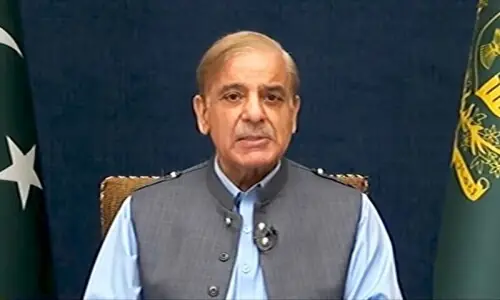PESHAWAR: With the April 20 deadline for the launch of the Peshawar Bus Rapid Transit service drawing closer, it seems to be a race against time for the authorities to ensure the project’s completion in the next 50 days.
The PTI-led provincial government had announced that the Rs49 billion flagship project would be successfully executed in six months.
Work on it had begun on Oct 20 last year.
Sources insist frequent changes to design will delay bus service, increase cost by Rs2bn
The sources said the frequent fiddling with the project’s design even several months after its launch was not only going to delay the completion of work but it was also likely to add the over Rs2 billion cost overrun to the project.
“The project’s completion within the deadline seems almost impossible,” a source said.
Last week, project director Sajjad Khan also proceeded on medical leave.
However, the sources attribute his departure to the government’s growing frustration with the project.
Mr Sajjad had overseen the project at the design phase until it was handed over to the Peshawar Development Authority (PDA) for execution.
The officials claimed that Mr Sajjad recently began talking about the course correction in meetings much to the ire of the PDA officials, who considered him to be responsible for planning blunders.
They said the project authorities opined that the PC-I’s revision to enhance the project cost would have to be undertaken at the execution stage due to the unforeseen circumstances, which led to several changes.
A senior government official told Dawn that the exact amount of the revised cost was not clear at the moment as the situation was very much fluid but it was likely to be above Rs2 billion.
The background discussions with the officials paint a picture of a project in a flux with frequent changes and infighting. Sources said that project’s funder Asian Development Bank (ADB) get so much angry with pace of design changes that it fired a nasty email to the project managers chiding them for carrying out alterations with the donor’s approval.
Several sources said the faulty designing process was haunting the project, as large numbers of changes were made to the project, while several others were likely to emerge as the work progressed.
The sources said the detailed engineering design done at the cost of Rs1.253 billion was faulty and was apparently made without keeping ground realities in view.
“The preliminary design accounts for nearly 10 per cent of the detailed design which in turn accounts for up to 85 to 90 per cent of the project,” a source said.
He said at the execution stage, only variations were encountered and minor changes were made to accommodate them.
“What is happening in the Peshawar BRT project are not variations but the wholesome changes,” another source claimed, adding that it would be a blunder when you go for elevated level from ground and construct an underpass instead of elevated section.
The sources said the project has so far faced several major changes which could not have taken place in case it would have been designed meticulously.
“What really happened at design stage was that the designers just drawn lines on google earth but rarely ventured into the field,” a source said, adding that otherwise these changes would not have to be made.
The project designers, sources said that remained unaware of the existence of a 19th century drain, which at the execution stage disrupted their plan to construct a mix traffic underpass at the site. Similarly, they also ignored the fact that a grade level route would close entry and exit points to Gulbahar and Nishtarabad neighborhoods. The contractors first went for grade level route parallel to the Arbab Sikandar flyover but this led to closure of major traffic arteries, forcing the officials to consider building elevated portion next the flyover.
They dug up several piers after this realisation.
However, it had to be abandoned all of the sudden after the ADB objections.
Work on the portion of Pir Zakori Bridge, which will lead the BRT traffic to the GT Road has also yet to start.
Similarly, the construction of another mix traffic underpass at the junction of the Khadim Hussain Road and Airport roads had to be abandoned as it left little room traffic coming towards cantonment area and going to University. It forced the planners to abandon the underpass and go elevated at this spot.
At Gora Qabristan, a nearly completed underpass to be dismantled as due to narrow curve, which could have led to collision of vehicles coming from opposite directions.
On University Road, the authorities decided to construct elevated portion from the KFC to Tambowano Morr after digging of the BRT corridor left only a single lane for mixed traffic.
A source told Dawn that the University Road was likely to have lost parking space after construction of two stations on the main road and it could spell disaster for city’s one the busiest business district.
A senior official associated with the project confirmed a lack of proper planning. “Unfortunately, the planning was not up to the mark,” he said.
Another source told Dawn that the work on two bus depots was yet to start and in their absence it was not clear how the service was going to hit the road.
The haphazard nature of planning can be judged from fact that the authorities had only made token allocation of Rs1,000 as the provincial government share of the project in budget 2017-18.
However, in order to be able to pay for taxes and custom duties on buses, they have to rush to provincial cabinet to approve over Rs. 5 billion as supplementary grant.
Ironically, an army of the project’s staff members is drawing from Rs5,000 to Rs300,000 a month as BRT allowance since Dec 2016.
The details available with Dawn show that the number of the buses has also been reduced from 299 to 220 and the contract has been awarded to a Chinese company Xiamen Golden Dragon Bus Company, which offered lowest bid of Rs5.478 billion for supplying buses.
Transport secretary Kamran Rehman denied the reports of cost escalations, saying PC-I is revised in case of difference between costs and estimates and currently there was no need for it.
He also denied reports of Mr Sajjad removal and said he was very much part of the project.
When contacted, PDA director general Israrul Haq said the authority had completed around 50 per cent work on the project.
He said he was hopeful that the project would be completed on time.
“We have not changed the deadline. Any change will be made keeping the project progress in view,” he said.
Mr Israr said changes to the design were routine issues, which arose from time to time and were decided accordingly.
About the revision of the project’s PC-I, he said it was very big and complex project, its PC-I’s revision was an ongoing process.
The PDA chief denied any cost overrun at the moment.
“I have no knowledge of it (cost overrun),” he said.
Mr Israr also denied reports of difference of opinion with the ADB on the project.
Published in Dawn, March 2nd, 2018


